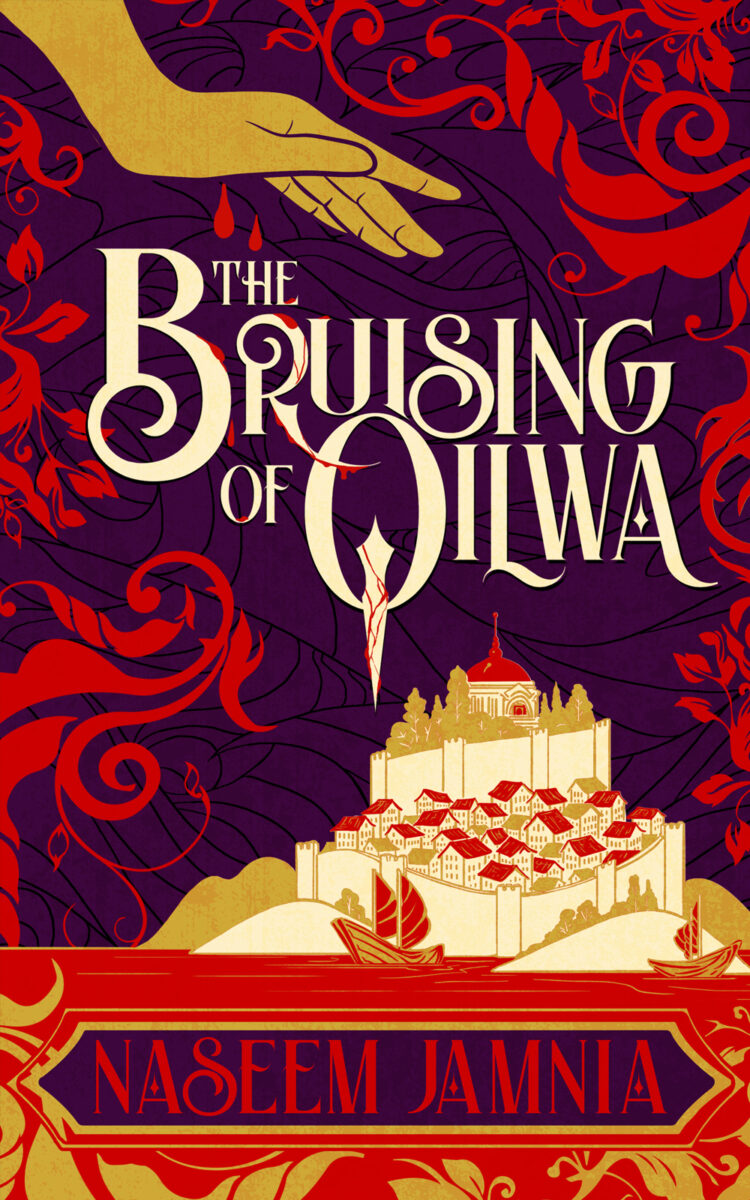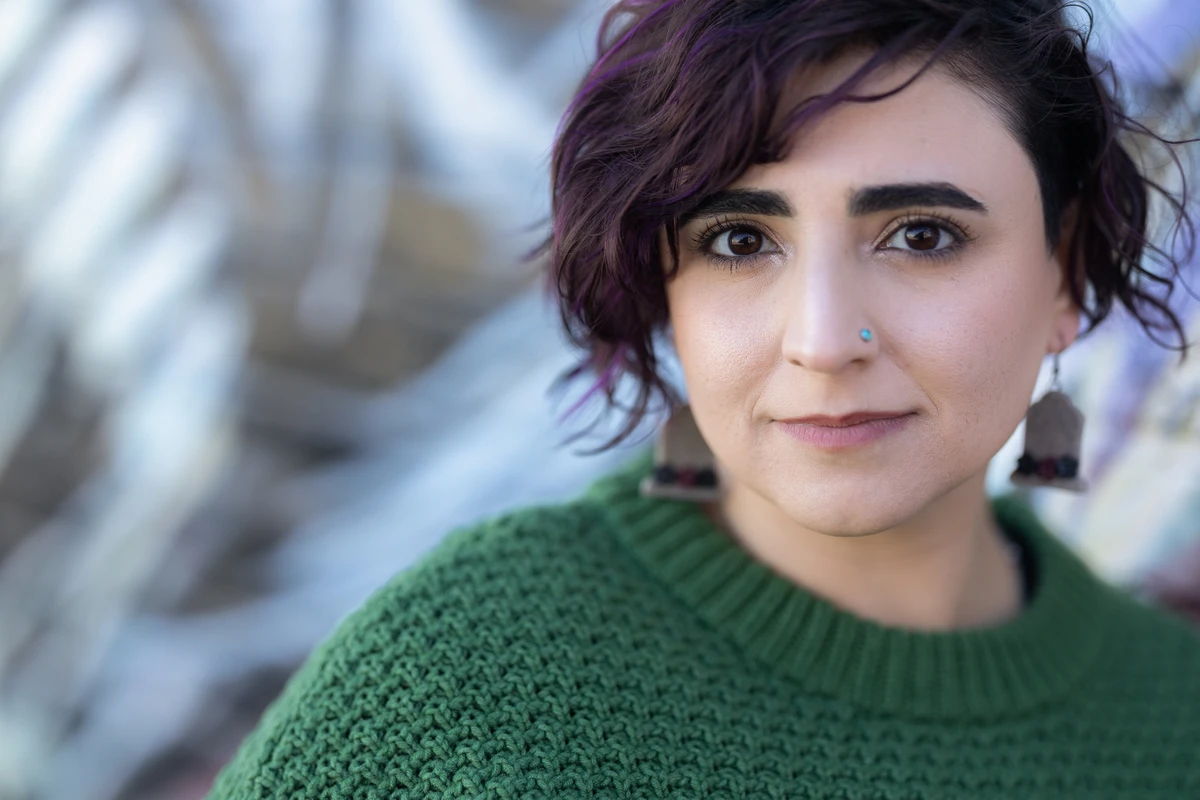The independent city-state of Qilwa has seen better days. Beset by plague, the city is fracturing along ethnic and class lines, with the wealthy hiding in their homes while the poor and disempowered fight for what very few resources are available for treatment. No, this book isn’t set in 2020, and no, I don’t think it’s too soon for Naseem Jamnia’s debut The Bruising of Qilwa to hit the shelves. This book isn’t about mournful reflection but about ceaseless action, the kind of book that never gives up.
That’s mostly because its amazing protagonist never gives up. Firuz is a healer to their core, dedicated to helping all people at all times. They are ethnic Sassanian, a persecuted minority in the nation of Dilmun, and have fled with their family to Qilwa in search of safety. Though magic is by no means forbidden, their own kind of magic, which manipulates the blood and thereby the human body, is held in such immense suspicion that they must hide their training even during a plague. They pretend to be a simple healer, and they get a job at the last free clinic in the city in order to support their mother and brother.

But what they find, along with immense need and limited treatment options, is even more trouble than they bargained for. There’s another Sassanian refugee with their blood-working talents, untrained and alone, who Firuz cannot ignore despite their own limited means. And there’s a second plague, a secret plague, that’s leaving eerie corpses in its wake. Bodies that seem to be the product of too much life, barely decomposed but definitely dead. What exactly is going on in Qilwa, and can Firuz figure it out without losing their family, their safety, or their own life?
I loved Firuz’s magic. It takes some standard fantasy tropes of elemental manipulation and elevates it with advanced knowledge of medical principles. Firuz understands how marrow produced blood, how bodies fight infection, and so much more. We know that Iran and the Middle East were miles and miles ahead of Europe in medical science in roughly the medieval period, and it’s so nice to see the whole “medieval fantasy” trope given this viewpoint—not swords, but science!
Of course, medical insight doesn’t fix societal issues, or even Firuz’s own life. Firuz is so attuned to others’ needs that their boundaries become very porous, and they repeatedly give of themselves even beyond the point of exhaustion. Because of this, their relationship with their brother begins to suffer. Parviz is struggling because his body does not currently match his gender. In a Sassanian community in Dilmun he could have gotten expert treatment from experienced elders just as Firuz did, but in Qilwa there is no one skilled enough to perform the surgical interventions. He does what he can with a binder and other interventions, but it’s not enough.
Firuz is working to support the entire family, and does not have the luxury of focusing solely on their brother; Firuz does not prioritize their beloved brother enough or set aside the time and energy to be brave enough for difficult conversations. Both are true. At every level, The Bruising of Qilwa is about full and complex human beings in terribly difficult situations, and the imperfect choices they make with only imperfect information to work from.
It was a little frustrating to see how Firuz could have repaired a lot of the situation with some forthright conversations, but their reluctance is mostly justified by their situation and character. They don’t want to harm their brother—the one person they really connect to from their old home, their inspiration to keep going—by giving him false hope, and they really don’t want to risk performing a surgery on him that might go awry. Firuz is very cautious and protective of what little they have left, a natural response to such devastating loss and trauma. They are trying to build a new life and hold to the old life they didn’t willingly give up, and they naturally make missteps in navigating the two poles in such a perpetually worn-out state.

Firuz’s exhaustion is palpable, which I found surprisingly cathartic: as we limp beyond the Covid-19 pandemic, seeing someone really insist on portraying the toll of a pandemic was almost a relief. You didn’t imagine it. It really was bad, Jamnia confirms. Bad—and worse for the underprivileged, who the Qilwan government refuses to help and instead scapegoats as instigators of the plague. (No, you didn’t imagine that either.)
But beats of the story come out of order, with details about Firuz’s escape from oppression in Dilmun getting dropped with little context at incongruous moments. Sudden mentions of huge, deadly birds felt a little out of left field when already 2/3rds through the book, and we never learn exactly what their role was in Firuz’s own story. What finally convinced them to leave, and what was their journey like?
I wonder if Jamnia made the deliberate choice not to provide this information; were they making a philosophical point about not needing to exploit a refugee’s anguished backstory in order to generate sympathy? If so I can appreciate the approach, since Firuz is plenty interesting and sympathetic. However, this is a book about Firuz from Firuz’s own perspective, and I needed more context just to situate them in the political and historical landscape.
I get the impression that the author doesn’t have full confidence in their prose because they fills in many scenes with the bare minimum of description, or sometimes even a little less than that. It’s as if they don’t want to go overboard with detail, and therefore goes too far in the opposite direction, robbing us of Firuz’s impressions, their feelings, and details about the world. This leaves some of the action disjointed and some scenes a bit head-scratching, like when Firuz encounters a government official unexpectedly wearing clothing that their mother and brother had worked on. That’s a huge coincidence for one person to be wearing a specific outfit on a random day in a huge bureaucratic complex, but Jamnia never explains or remarks on it, only uses the opportunity to show the difference between the haves and have-nots. It’s natural for Firuz and for Jamnia to reflect on that, but with only a line or two about how it is a coincidence, I might not have been thrown out of the story.
Quibbles aside, the story is a really good one, both from the individual level and the theoretical. Jamnia is making a lot of complex, wise points not just about the wealth gap, but also about the fine line between use and abuse of power, the pervasiveness of prejudice, and the way no one can opt out of empire. Everyone’s history is suffused with mistakes; everyone’s culture has troubling aspects. Fixing it is not about assigning blame, but rather about accepting responsibility—some responsibility, but not all. It is not one person’s job to fix the world or the past.
The big reveal isn’t so surprising, given the lack of alternative suspects, but Jamnia does a good job of trying to throw us off. I appreciated that the confrontation, though appropriately dramatic for a climax, stayed true to the spirit of all that came before. Firuz must grapple with their new reality and their past traumas all in one, and the dangers are only partially from the outside. Their elders and allies also imperil them, and they can’t fall back on any kind of good/evil dichotomy. Qilwa and Firuz are much too complex for that. Jamnia has given us a world of challenges and complications, not easy solutions, and I am so grateful to have been able to read about it.
The Bruising of Qilwa will be released August 9, 2022. Thank you to Tachyon for providing us with a review copy.
